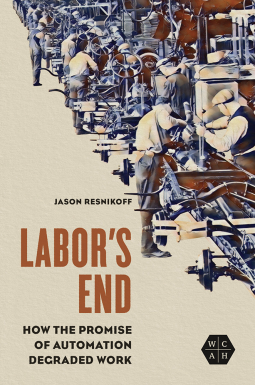
Labor's End
How the Promise of Automation Degraded Work
by Jason Resnikoff
This title was previously available on NetGalley and is now archived.
Send NetGalley books directly to your Kindle or Kindle app
1
To read on a Kindle or Kindle app, please add kindle@netgalley.com as an approved email address to receive files in your Amazon account. Click here for step-by-step instructions.
2
Also find your Kindle email address within your Amazon account, and enter it here.
Pub Date 18 Jan 2022 | Archive Date 9 Feb 2022
Talking about this book? Use #LaborsEnd #NetGalley. More hashtag tips!
Description
Seeing automation as an ideology instead of a technology
Labor's End traces the discourse around automation from its origins in the factory to its wide-ranging implications in political and social life. As Jason Resnikoff shows, the term automation expressed the conviction that industrial progress meant the inevitable abolition of manual labor from industry. But the real substance of the term reflected industry's desire to hide an intensification of human work--and labor's loss of power and protection--behind magnificent machinery and a starry-eyed faith in technological revolution. The rhetorical power of the automation ideology revealed and perpetuated a belief that the idea of freedom was incompatible with the activity of work. From there, political actors ruled out the workplace as a site of politics while some of labor's staunchest allies dismissed sped-up tasks, expanded workloads, and incipient deindustrialization in the name of technological progress.
A forceful intellectual history, Labor's End challenges entrenched assumptions about automation's transformation of the American workplace.
Jason Resnikoff is a lecturer in the Department of History at Columbia University.
Advance Praise
"Resnikoff's forceful and coherent argument reveals that automation was not a technological process but an ideology which equated freedom with freedom from work and downplayed the workplace as a site of politics. As he convincingly shows, automation largely did not lead to a reduction in labor but rather to speedup, work intensification, and the degradation of labor, creating a huge chasm between the grandiose claims made about an automated future and the lived reality of workers."--Joshua Freeman, author of Behemoth: A History of the Factory and the Making of the Modern World
Available Editions
| EDITION | Other Format |
| ISBN | 9780252086298 |
| PRICE | US$24.95 (USD) |
| PAGES | 280 |



